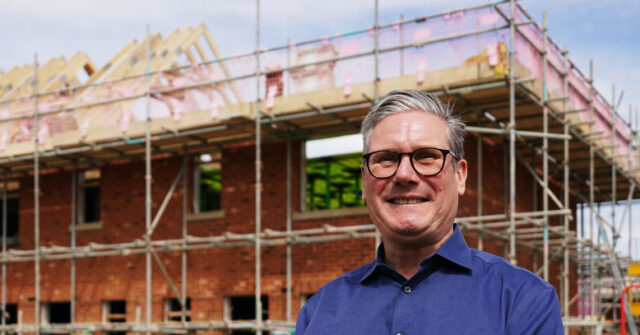The current housing crisis in the United Kingdom is intricately tied to the issue of immigration, as emphasized by the National Federation of Builders (NFB). They argue that the soaring population, attributed largely to migrant arrivals, necessitates the importation of foreign workers to address the urgent demand for housing. Despite more deaths than births each year, the population growth driven by mass migration has culminated in an unprecedented housing supply crisis. Young people, especially, find themselves in a precarious position, with purchasing a home seeming increasingly out of reach due to soaring prices driven by demand that far exceeds supply. This situation is fostering political discontent and raising concerns about long-term sustainability.
The current government’s approach to tackling the housing shortage has revolved around increasing supply rather than implementing effective border control measures that could effectively reduce demand. Establishment parties have demonstrated a preference for aggressive development over preserving local interests. Labour leader Sir Keir Starmer’s commitment to constructing 1.5 million new homes by the end of the current parliamentary term highlights this focus on supply. However, housebuilders warn that a severe shortage of skilled tradespeople impedes rapid construction. In an apparent shift of responsibility, the NFB has advocated for extensive temporary visas for foreign workers rather than investing in domestic workforce training programs.
The statistics emphasize the reality of the UK’s demographic landscape: immigration has accounted for 82% of the population growth this century, with net arrivals now averaging close to one million annually. Since 2011, the population has surged by over four million, while the nation’s birth rate continues to decline. The construction industry requires an estimated 250,000 additional workers over the next five years to fulfill government targets. Despite rising unemployment, the reliance on migrant workers suggests a preference for foreign-trained labor over the complexity and longer timeline of training domestic apprentices.
As the construction industry’s demands collide with political interests, a troubling relationship emerges between industry lobbies and government action. The construction sector’s influence is not merely anecdotal but is backed by significant financial donations to the Conservative Party. Key figures, such as Lord Bamford—whose company supplies construction machinery—have been noted for their influential ties, effectively creating a scenario where the politicians might cater to the interests of their donors. Critics argue that this dynamic implicitly undermines the voices of local communities, enriching developers at the expense of democratic engagement regarding housing policy.
The discourse surrounding the close ties between construction-related donations and the Conservative Party raises serious concerns about the motivations behind housing policy. While Labour raises concerns about these financial influences, it often lacks the strength to address its own connections to influential donors, leading to criticisms that lack a foundational basis in mutual accountability. The emphasis shifts from the rights and needs of local populations to the demands of an industry that enjoys both political influence and economic power. This relationship complicates attempts to reform planning laws or housing policies that would benefit the average citizen rather than the interests of wealthy construction firms.
In summation, the struggle for housing in the UK is deeply woven into the fabric of immigration policy, industry lobbying, and political donor relationships. The approach to managing the housing crisis—preferencing immediate supply solutions through immigration rather than fostering a domestic skilled workforce—highlights systemic issues within the political landscape. As the nation grapples with population pressures and the realities of a housing market that increasingly favors developers over residents, a profound reckoning is necessary to rethink the relationship between politics, housing, and the voices of the communities affected. Without addressing these dynamics, the aspiration of affordable homeownership may remain a distant dream for many young people in the UK.

